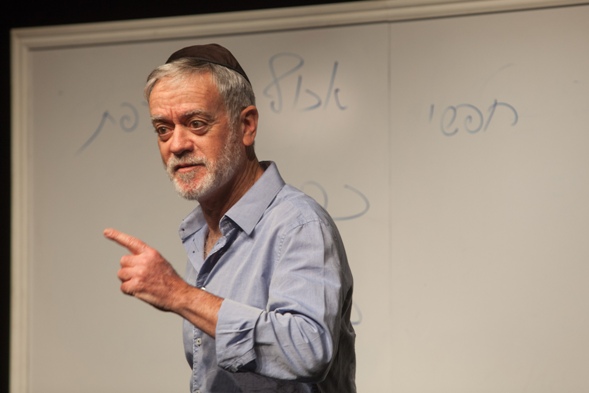
The clever satire of Mithazkim, the Khan Theatre’s latest play, had me laughing almost all the way, until about three quarters through the evening, when it made me shudder with horror. Written by B. Michael (the pen name of Michael Brizon, who writes satirical columns and op-eds for Haaretz), the one-person play originally premiered at the Israel Festival in 1987, and relates to the practice of conducting lectures, workshops and other activities aimed at returning Jews to religious observance . The word “mithazkim” means “growing stronger,” as in growing stronger in one’s faith or religious observance. The current production features an updated text, and is directed by Michael Gurevitch, with an outstanding performance by Yehoyachin Friedlander. I’ve been thinking about the play for over a week now, and I can’t shake it off. That is satire at its best, when it takes on those aspects of society that are so explosive, so deeply engaged with the core of our existence and moral code, that we are afraid to touch them. There is no doubt, this is a play that will make some people very angry, because it probes and explicitly expresses strong opinions on the most controversial issues facing Israeli people today.
The power of parody lies in verisimilitude, and the play is structured and conducted like a seminar, with the appropriate simple stage set – a table and the ubiquitous lecturer’s water glass, whiteboard, a somewhat mysterious suitcase; and the audience as the albeit silent, participants. The lecturer (Yehoyahin Friedlander) enters, an exceedingly charming man, with a deep and sonorous voice, his neatly trimmed white beard conveying a benign and almost fatherly appearance. Conservatively dressed with a well-pressed blue shirt and gray slacks, his appearance inspires admiration and trust. He smiles at the audience and promises: “I’m not going to brainwash you.” Cue irony.
What follows is a virtuoso performance of verbal acrobatics, as he confounds reason, bends outrageous statements into pretzels and expects the audience to swallow them whole. It’s hilarious. He makes abundant use of Gematria (a system that assigns a numerical value to each Hebrew letter, in the belief that there is a meaningful relationship between words or phrases with identical numerical values)to prove his point. Thus, coercion equals love.
Friedlander is wonderful in this role, his affable, sincere demeanor making the distorted convictions, the endless flow of tortuous and bizarre logic all the more funny. Extreme and exaggerated as the scenario may feel, the quotes from religious pamphlets and real persons are actual quotes, and the play is based on research of these seminars and workshops. So, yes, these modes of rhetoric and reasoning really are employed in a manner very similar to that which is seen onstage, the play’s brochure even offers several examples. Orange juice as proof of God’s existence, the discussion of evolution, and other such gems make this play incredibly funny. On the night I saw the play, there was lots of laughter heard throughout the audience, until a crucial juncture when the theatre was filled with an electrifying silence.
Does it go too far, is this play an attack on religion or belief? I don’t think so. It is a harsh critique of the means by which people seek to convince others of certain beliefs, and the ways in which religion is used and abused. Mithazkim ventures into a minefield, boldly criticizing those who use religion to usurp the higher moral ground, even when their actions are abhorrent, and the government, which, by its silent complicity, condones these actions. I believe we should feel horrified.
Mithazkim
Written by B. Michael; Directed by Michael Gurevitch, Performed by Yehoyahin Friedlander; Design: Rut Miller.





